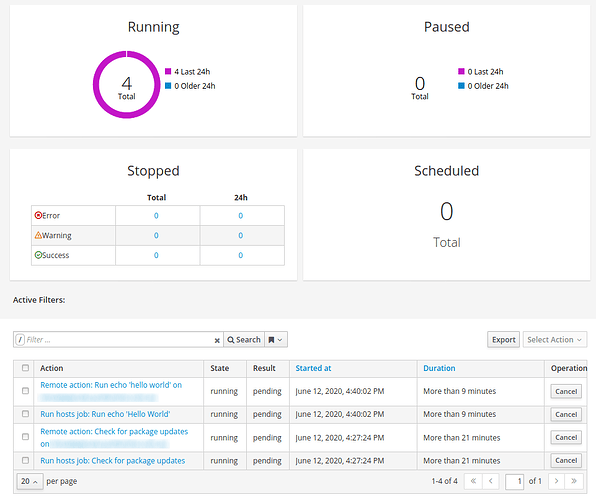Problem: Schedule Remote Job fails on CentOS 8 / Foreman 2.1rc2
Expected outcome: Same system build procedure works on CentOS 7 / Foreman 2.1rc2
Foreman and Proxy versions: 2.1rc2 repositories for CentOS 7 and CentOS 8
**Foreman and Proxy plugin versions:**2.1rc2 repositories for CentOS 7 and CentOS 8
Distribution and version: CentOS 8.1 x86_64 (updated with all available patches)
NOTE: I have two files I’d like to attach to this posting (build notes and journalctl log), but new users are not permitted to upload attachments (a reasonable restriction). So I hope this post has enough details.
Greetings,
I’m new to foreman, but not to programming and system administration related to provisioning but mostly automation, I have been do that for over two decades ![]()
I’m starting on the bleeding edge with CentOS 8.1 and Foreman 2.1rc{1,2}, and have managed to get a Foreman VM up and going for the provisioning aspects. I moved on to Remote Execution as it a prerequisite for Ansible functionality which I would like to explore. (Also I have a Katello integration question as a postscript)
I have created detailed notes on the build procedure used to reproduce the problem in a clean (and minimal) environment, but would like assistance in debugging the problem (I’m not ruby or web developer), before raising it it as a bug.
On submitting a “Schedule Remote Job” request on CentOS 8 (but not CentOS 7), the key points as I see them are:
WebUI (CentOS8) - clicking on the host name on job failure:
1: Initialization error: RestClient::NotFound - 404 Not Found
2: Failed to initialize: TypeError - Value (ActiveSupport::TimeWithZone) '2020-06-05 15:10:46 +1000' is not any of: (Time | NilClass).
From journalctl (see details further down), instances of:
‘ERROR -- /client-dispatcher: Could not find an executor for Dynflow::Dispatcher::Envelope’
/var/log/foreman-proxy/proxy.log (CentOS8):
dateTtime hexcode Started GET /version
dateTtime hexcode Finished GET /version with 200 (0.35 ms)
dateTtime hexcode Started POST /dynflow/tasks/launch
dateTtime hexcode Finished POST /dynflow/tasks/launch with 404 (16.86 ms) ***
dateTtime hexcode Started POST /dynflow/tasks/
dateTtime hexcode Finished POST /dynflow/tasks/ with 500 (34.28 ms) ***
dateTtime hexcode Started GET /dynflow/tasks/status
dateTtime hexcode Finished GET /dynflow/tasks/status with 404 (21.94 ms) ***
dateTtime hexcode Started POST /dynflow/tasks/launch
dateTtime hexcode Finished POST /dynflow/tasks/launch with 404 (13.92 ms) ***
dateTtime hexcode Started POST /dynflow/tasks/
dateTtime hexcode Finished POST /dynflow/tasks/ with 500 (33.12 ms) ***
/var/log/foreman-proxy/smart_proxy_dynflow_core.log (CentOS8):
IP - - Date/Time "GET /tasks/count?state=running HTTP/1.1" 200 29
IP - - Date/Time "POST /tasks/launch? HTTP/1.1" 404 46 ***
IP - - Date/Time "POST /tasks/? HTTP/1.1" 500 153486 ***
IP - - Date/Time "GET /tasks/status? HTTP/1.1" 404 555 ***
IP - - Date/Time "POST /tasks/launch? HTTP/1.1" 404 46 ***
IP - - Date/Time "POST /tasks/? HTTP/1.1" 500 153525 ***
IP - - Date/Time "GET /tasks/count?state=running HTTP/1.1" 200 29
IP - - Date/Time "POST /tasks/launch? HTTP/1.1" 404 46 ***
IP - - Date/Time "POST /tasks/? HTTP/1.1" 500 153524 ***
IP - - Date/Time "GET /tasks/status? HTTP/1.1" 404 555 ***
IP - - Date/Time "POST /tasks/launch? HTTP/1.1" 404 46 ***
IP - - Date/Time "POST /tasks/? HTTP/1.1" 500 153524 ***
From journalctl | egrep -i ‘dynflow|proxy|foreman’ (CentOS8):
timestamp hostname smart-proxy[9550]: IPv4Address - - [05/Jun/2020:15:02:31 AEST] "POST /dynflow/tasks/launch HTTP/1.1" 404 46
timestamp hostname smart-proxy[9550]: - -> /dynflow/tasks/launch
timestamp hostname smart-proxy[9550]: IPv4Address - - [05/Jun/2020:15:02:31 AEST] "POST /dynflow/tasks/ HTTP/1.1" 500 153525
timestamp hostname smart-proxy[9550]: - -> /dynflow/tasks/
timestamp hostname dynflow-sidekiq@worker[9431]: E, [2020-06-05T15:02:31.678240 #9431] ERROR -- /client-dispatcher: Could not find an executor for Dynflow::Dispatcher::Envelope[request_id: 118e2f8d-9b56-4063-844d-9e9a4d96fb37-4, sender_id: 118e2f8d-9b56-4063-844d-9e9a4d96fb37, receiver_id: Dynflow::Dispatcher::UnknownWorld, message: Dynflow::Dispatcher::Event[execution_plan_id: 2f734f26-5a69-4be1-bdcf-d82d2e288559, step_id: 3, event: #<Actions::ProxyAction::ProxyActionStopped:0x0000559e3a57cf00>, time: ]] (Dynflow::Error) ***
timestamp hostname dynflow-sidekiq@worker[9431]: client_dispatcher.rb:147:in `dispatch_request'
timestamp hostname dynflow-sidekiq@worker[9431]: client_dispatcher.rb:118:in `block (2 levels) in publish_request'
timestamp hostname dynflow-sidekiq@worker[9431]: client_dispatcher.rb:206:in `track_request'
timestamp hostname dynflow-sidekiq@worker[9431]: client_dispatcher.rb:117:in `block in publish_request'
timestamp hostname dynflow-sidekiq@worker[9431]: client_dispatcher.rb:248:in `with_ping_request_caching'
timestamp hostname dynflow-sidekiq@worker[9431]: client_dispatcher.rb:116:in `publish_request'
timestamp hostname dynflow-sidekiq@worker[9431]: [ concurrent-ruby ]
…
Note: client_dispatcher.rb as actually /usr/share/gems/gems/dynflow-1.4.4/lib/dynflow/dispatcher/client_dispatcher.rb
I have then enabled ‘:log_level: DEBUG’ in /etc/smart_proxy_dynflow_core/settings.yml and
/etc/foreman-proxy/settings.yml and have included the output in the attached build procedure, but the above are the highlights.
Key Points: Foreman 2.1rc2 / CentOS 8 / Remote Execution → Fails
I hope that the details provided in the attached text file will give any one able to help a clear view of the steps taken to date and the results seen on CentOS 7 (working) versus CentOS 8 (not working).
Many Thanks in Advance,
Peter
Sydney, Australia
PS: One quick question, if you don’t mind: It is my understanding from my reading to date, that Katello and Pulp (which worked out of the box on CentOS 7), are intended to run on a separate system from the main Foreman instance. Is this correct? And if so does anyone have a pointer to a write-up on the design of the larger system and the procedure to integrate Foreman and Katello/Pulp?


